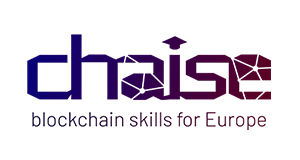Blockchain is at the core of the EU strategy to advance digital transformation, benefitting society/businesses and stimulating sustainable growth.
Sector
Blockchain
Topic
The European Blockchain Sector is well placed to acquire global leadership; still its competitiveness largely relies on the availability of competent/versatile workforce. Whereas the demand for blockchain skills is steadily increasing, employers are facing a shortfall of skilled professionals. The sector is challenged by talents shortage, global competitive pressures, limited connection between education & the market. The aim of CHAISE is to set forward an open, inclusive blockchain skills governance system, to address skills mismatches and deliver appropriate training, intelligence gathering & mobility solutions tailored to sectoral needs.
Target Audience
Stakeholders representing industry, academia, policy and research from across the EU, students, blockchain workforce.
Consortium
CHAISE brings together leading multinational companies, key institutional players, EU umbrella organisations, social partners, thematically focused E&T providers and public authorities/regulators in education & training to deliver the project’s objectives.
Project Output
The CHAISE training programme will correspond to the 5th or 6th EQF level (to be defined during the project), leading to the award of a professional qualification, according to Directive 2013/55/EU on the recognition of professional qualifications. The CHAISE VET programme will be divided into 3 main components, each assigned with a different weight:
a) technical modules
b) non-technical modules incl. soft skills
c) work-based learning
The CHAISE VET programme, following EU standards, is foreseen to have a 5 semester duration, broken down into 4 semesters of classroom and lab-based learning (up to 1,200 teaching hours) and 1 semester of work-based learning (up to 900 hours). The modular structure of the curriculum will also facilitate deployment in Continuous VET (C-VET) environments, enabling trainers and learners to focus on the modules most relevant to their training needs and particular skills deficiencies.
 |
The European Commission's support for the production of this publication does not constitute an endorsement of the contents, which reflect the views only of the authors, and the Commission cannot be held responsible for any use which may be made of the information contained therein. |
